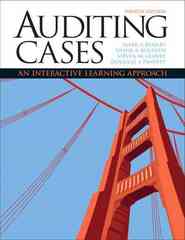Question
We have to make decisions every day, and both internal and external factors influence them. However, many people appear to have difficulty choosing an ethical
We have to make decisions every day, and both internal and external factors influence them. However, many people appear to have difficulty choosing an ethical course of action. An ethical choice "is defined as a decision that is both legal and morally acceptable to the larger community" (Jones, 1991, p. 367). People aspire to have those in positions of power who can exercise sound judgment, are reliable and honest, and are capable of making morally and ethical decisions. People tend to be suspicious of anything a person in power does when they fail to exhibit these qualities. All of that person's accomplishments could have been damaged by one unethical choice, despite the fact that they may have worked wonders for years. That should prompt people to take their time and make sure that any decisions they make are for the greater good, yet most of the time, money, power, and greed cloud their judgment. Leroy Upshaw, the long-serving sheriff of Barbour County, just so happens to be in this situation. Upshaw stated that during his 20 years of service, he or officers under him acting on his orders issued him checks totaling $32,135 and pleaded guilty to felony ethical charges.This money was taken from the official bank accounts for the sheriff's office. The funds that Upshaw stole were intended for funding prisoner care and law enforcement, but Upshaw acknowledged that they never reached either of those accounts and instead ended up in his or his family's personal bank accounts. Upshaw entered a guilty plea to a class B felony charge of exploiting his official position for personal advantage. The Alabama Attorney General and I are confident that the people of Barbour County view this as a victory despite the fact that he misused taxpayer funds and broke the public's trust. Upshaw failed to consider the ethical principles in light of the behavior he was engaging in. The components of ethics include obligations, values, and regulations. These three criteria are frequently used to determine if a person's acts are morally righteous. We might not be aware of the sheer volume of minor and large decisions we make on a daily basis. Being in the HR sector, I have to make sure that every choice I make is moral, ethical, and serves the greater interest of every employee, whether it be changing the way a policy is implemented or taking disciplinary action against an employee. We handle extremely sensitive material on a daily basis, as I have discovered early in my HR career, so HR practitioners must uphold ethical and moral behavior constantly.
Question?
What is the overall main point and objectives ?
What moral issue is present ?
What are some good takeaways?
Step by Step Solution
There are 3 Steps involved in it
Step: 1
Overall Main Point and Objectives The main point is to emphasize the importance of ethics in decisio...
Get Instant Access to Expert-Tailored Solutions
See step-by-step solutions with expert insights and AI powered tools for academic success
Step: 2

Step: 3

Ace Your Homework with AI
Get the answers you need in no time with our AI-driven, step-by-step assistance
Get Started


